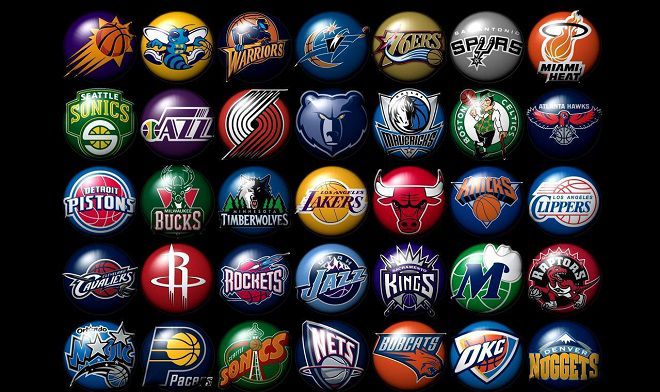The National Basketball Association (NBA) is a men’s professional basketball league in North America, consisting of 30 teams across the United States and Canada. Founded in 1946, the NBA has grown to become one of the most popular and lucrative sports leagues in the world. Its popularity can be attributed to the high level of athleticism, the fast-paced and exciting gameplay, and the individual talents of its players.
The NBA has produced some of the greatest players in the history of basketball, such as Michael Jordan, Kobe Bryant, and LeBron James, who have all become global icons. The league also features an intense rivalry between teams, which has fueled interest and passion among fans.
Moreover, the NBA has embraced new technologies and social media platforms, allowing fans to follow their favorite players and teams from anywhere in the world. The league has also been at the forefront of social and political activism, with players using their platforms to advocate for social justice causes.
All of these factors have contributed to the NBA’s incredible popularity, making it a major cultural phenomenon and one of the most-watched and followed sports leagues in the world.
Which NBA Teams Have Won the Most Over the Years?
There are a total of 30 teams in the NBA, but some have been more successful than others. The Boston Celtics and the Los Angeles Lakers are two of the most successful NBA teams in terms of championships won.
The Boston Celtics have won the most NBA championships, with a total of 17 titles. They won their first championship in 1957 and their most recent one in 2008. The Celtics have had some of the greatest players in NBA history, such as Bill Russell, Larry Bird, and Paul Pierce.
The Los Angeles Lakers are not far behind, having won a total of 16 championships. Their first championship came in 1949 when the team was still located in Minneapolis, and their most recent one was in 2020. The Lakers have had some of the most iconic players in NBA history, including Kobe Bryant, Magic Johnson, and Shaquille O’Neal.
Other successful NBA teams include the Chicago Bulls with 6 championships, the Golden State Warriors with 6 championships, the San Antonio Spurs with 5 championships, and the Miami Heat with 3 championships.
What Are the Most Popular NBA Teams?
The popularity of NBA teams can vary based on a number of factors, including recent success, individual players, fan base size and loyalty, and cultural or geographic factors. However, there are a few teams that are consistently considered among the most popular in the league.
The Los Angeles Lakers are generally considered one of the most popular teams in the NBA. The team has a long history of success, having won 16 championships, and has had some of the most iconic players in league history, such as Kobe Bryant and Magic Johnson.
The Golden State Warriors have also become increasingly popular in recent years, thanks in large part to their success on the court. The team has won three championships in the past five years and features some of the most exciting players in the league, such as Stephen Curry and Kevin Durant.
The Boston Celtics, Chicago Bulls, and New York Knicks are also considered among the most popular NBA teams. These teams have a strong following and a storied history of success, with each team having won multiple championships.
It’s worth noting that the popularity of NBA teams can also vary regionally. For example, the Miami Heat and the Houston Rockets may have particularly strong followings in their respective cities, while the Toronto Raptors have a significant fan base in Canada.
Which NBA Franchise Are Worth the Most?
According to Forbes’ latest valuations, the NBA franchises that are currently worth the most are:
- New York Knicks – $5.42 billion USD
- Los Angeles Lakers – $5.14 billion USD
- Golden State Warriors – $5.01 billion USD
- Chicago Bulls – $3.31 billion USD
- Boston Celtics – $3.20 billion USD
- Brooklyn Nets – $3.00 billion USD
- Houston Rockets – $2.77 billion USD
- Los Angeles Clippers – $2.75 billion USD
- Dallas Mavericks – $2.70 billion USD
- Toronto Raptors – $2.55 billion USD
The value of NBA franchises can fluctuate over time, based on a variety of factors such as team performance, market size, and revenue generation. However, these valuations provide a snapshot of the current state of the league, and highlight the significant financial value that many NBA franchises hold.
NBA franchise value is determined by a variety of factors, including team performance, market size, revenue generation, and brand strength. Here are some of the key factors that are typically taken into account when valuing NBA franchises:
- Revenue: The amount of revenue that a franchise generates is one of the most important factors in determining its value. This includes revenue from ticket sales, TV contracts, merchandise sales, and other sources.
- Market size: The size of a team’s market can also have a significant impact on its value. Teams in larger markets tend to have more potential revenue streams and a larger fan base, which can drive up their value.
- Location: The location of a team can also be a factor in its value, particularly if the team is located in a city with a strong basketball culture or a history of NBA success.
- Brand strength: The strength of a team’s brand can also play a role in its value, as a strong brand can attract fans and sponsors and generate additional revenue streams.
- Team performance: Finally, a team’s performance on the court can also impact its value. Teams that consistently perform well and win championships are generally more valuable than teams that struggle to compete.
All of these factors are considered when valuing NBA franchises, and the final valuation is typically based on a combination of these factors, as well as other market conditions, financials, and trends.

